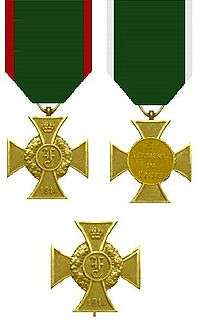Frederickscross
The Frederickcross (German: "Friedrich Kreuz or Friedrich-Kreuz") was instituted in 1914 by the ruling Duke of Anhalt, Frederick II of Anhalt as a decoration not unlike the Iron Cross for merit in time of war.
| Frederick-Cross (Friedrich-Kreuz) | |
|---|---|
 | |
| Awarded by | |
| Type | Military decoration |
| Awarded for | War merit |
| Statistics | |
| Established | 1914 |
| Last awarded | 1918 |
There are three versions of the Frederickcross
- A bronze cross on a green ribbon with red borders for combatants.
- A bronze cross on a green ribbon with white borders for non-combatants.
- A cross as a brooch (in German a "steckkreuz") that was worn without a ribbon.[1]
This cross pattée bore a crown on the upper arm and the date "1914" on the lower arm. In the central medallion is the monogram of the duke, two intertwined "F"'s. The reverse is flat but the central medallion bears the text "Für Verdienst" (For Merit")
In 1918 the Anhalt monarchy fell and the decoration was abolished.
William II of Germany and Fieldmarshall Paul von Hindenburg wore this cross.
References
- Nimmergut Katalog 2000, No. 81
This article is issued from Wikipedia. The text is licensed under Creative Commons - Attribution - Sharealike. Additional terms may apply for the media files.